#Inuit literature
Explore tagged Tumblr posts
Text
In this life, you will not know what the moon speaks Telling us of rain or snow and when to fish You are blind to the curled leaf, don't know what it seeks
Norma Dunning, The Young Fools
#Norma Dunning#Eskimo Pie: A Poetics of Inuit Identity#The Young Fools#moon#moon quotes#full moon#weather#rain#nature#nature quotes#National Indigenous Peoples Day#Inuit literature#Inuit poetry#Indigenous literature#Canadian literature#poetry#poetry quotes#quotes#quotes blog#literary quotes#literature quotes#literature#book quotes#books#words#text#language#language quotes
30 notes
·
View notes
Text
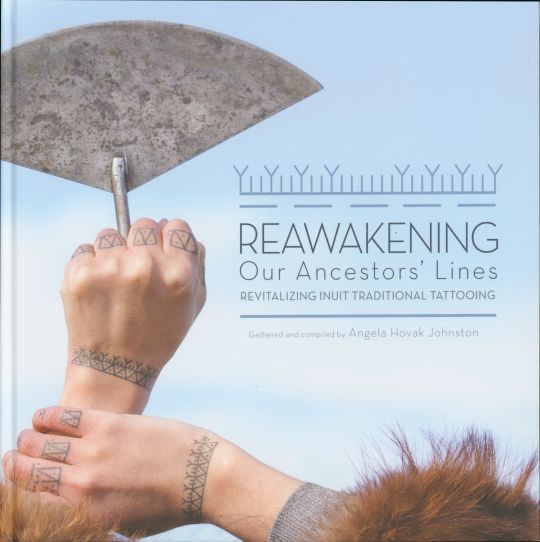
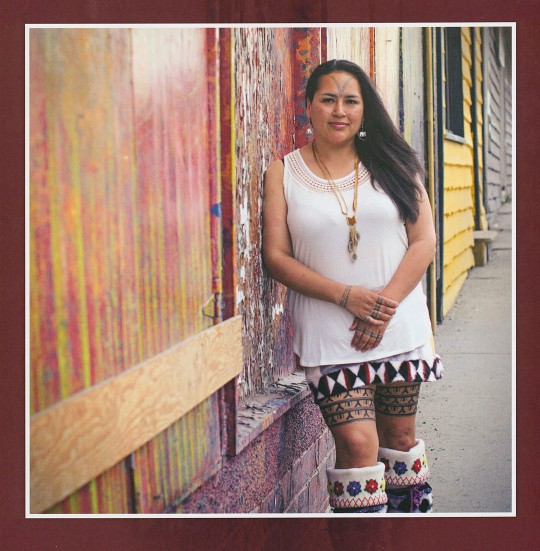
The author, Angela Hovak Johnston.

Johnston and Marjorie Tungwenuk Tahbone, traditional tattoo artist.
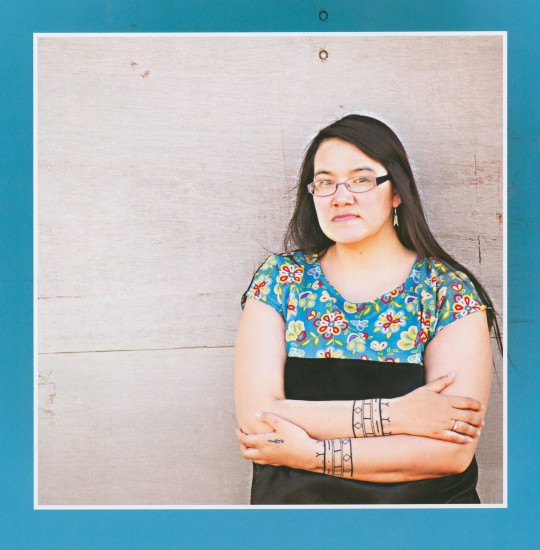
Catherine Niptanatiak: "I designed my own, something that represents me and who I am, something that I would be proud to wear and show off, and something that would make me feel confident and beautiful. . . . I have daughters and I would like to teach them what I know. I would like for them to want to practice our traditions and keep our culture alive."
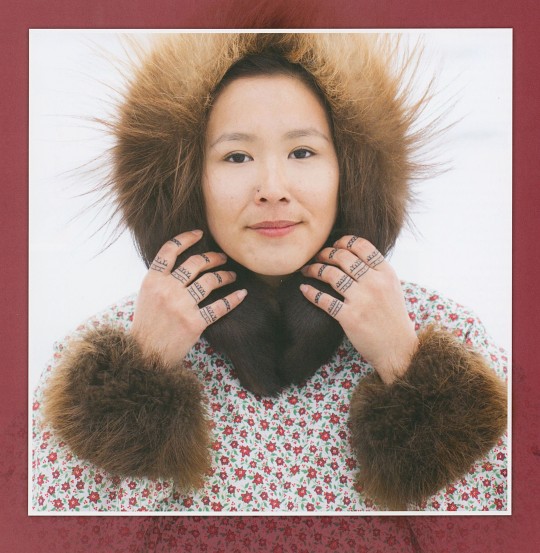
Cecile Nelvana Lyall: "On my hand tattoos, from the top down, the triangles represent the mountains. . . . The Ys are the tools used in seal hunting. . . . The dots are my ancestors. . . . I am so excited to be able to truly call myself and Inuk woman."
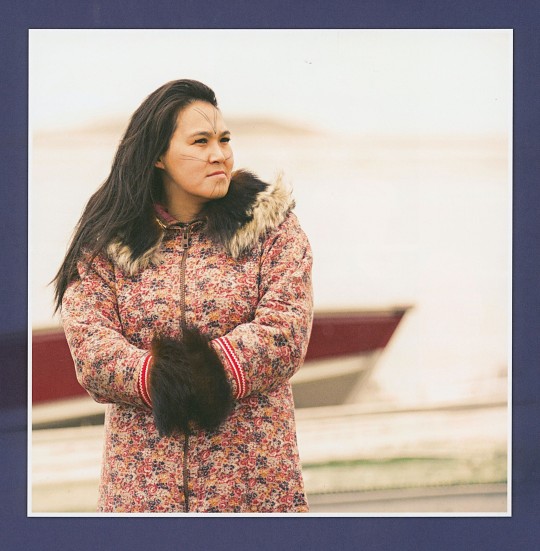
Colleen Nivingalok: "The tattoos on my face represent my family and me. The lines on my chin are my four children -- my two older boys on the outside protecting my daughters. The lines on my cheeks represent the two boys and the two girls on either side. The one on my forehead represents their father and me. Together, we live for our children."
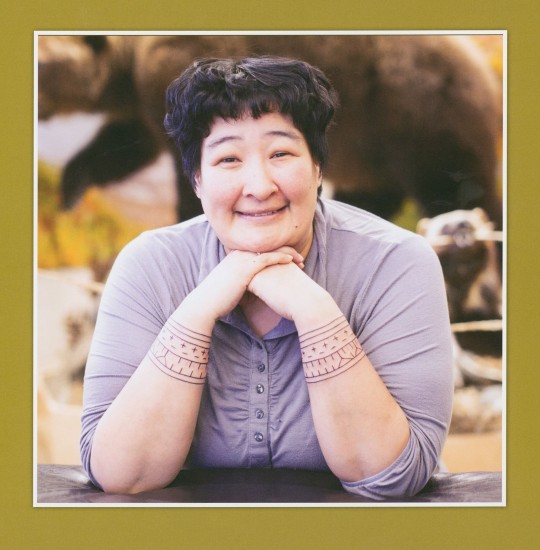
Doreen Ayalikyoak Evyagotailak: "I have thought about getting traditional tattoos since I was a teenager. . . . When I asked the elders if I could have my own meaning for my tattoos, they said it wouldn't matter. My tattoos symbolize my kids."
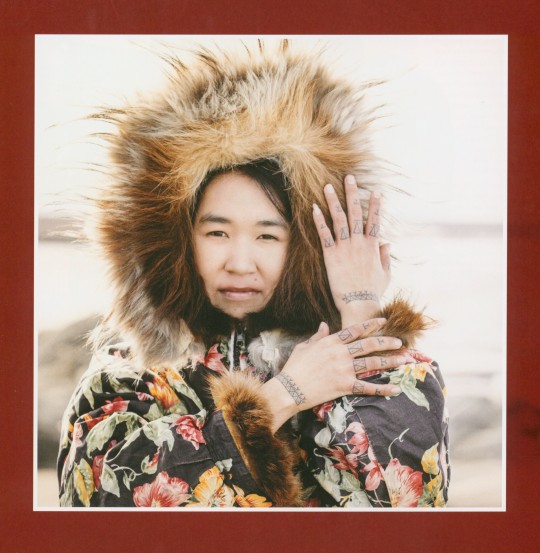
Mary Angele Takletok: "I always wanted traditional tattoos like the women in the old days. I wanted them on my wrists and my fingers so I could show I'm Inuk."

Melissa MacDonald Hinanik: "As a part of celebrating my heritage and revitalizing important traditional customs that form my identity, I believe I have earned my tattoos. I am a beautiful, strong young woman. I am a mother, a wife, a daughter, a friend, and an active community member. I reclaim the traditional customs as mine, I re-own them as a part of who I am."
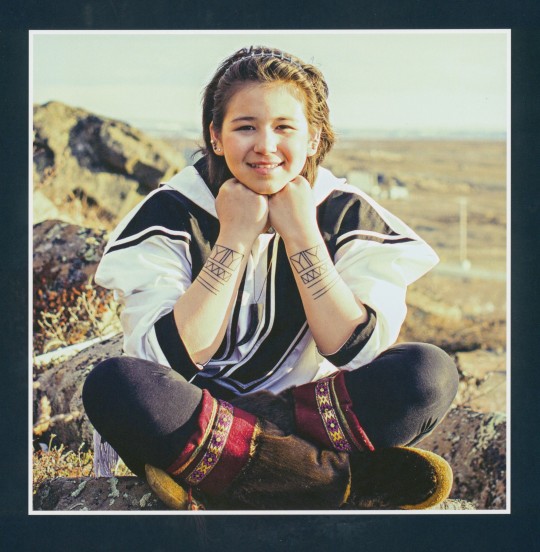
Star Westwood: "We still have some of our culture, but some things are slowly dying. Having tattoos helps us keep our culture alive. . . . . My tattoos represent my dad and my dad's dad. The ones closest to my wrists represent my sisters."
------------------------------------------------------------------------------
National Tattoo Day
July 17 is National Tattoo Day. To celebrate, we present some images from Reawakening Our Ancestors' Lines: Revitalizing Inuit Traditional Tattooing, compiled by Angela Hovak Johnston, co-founder with Marjorie Tahbone of the Inuit Tattoo Revitalization Project, with photographs by Inuit photographer Cora DeVos, and published in Iqaluit, Nunavut by Inhabit Media Inc. in 2017.
For thousands of years, Inuit have practiced the traditional art of tattooing. Created the ancient way, with bone needles and caribou sinew soaked in seal oil, sod, or soot, these tattoos were an important tradition for many Inuit women, symbols etched on their skin that connected them to their families and communities. But with the rise of missionaries and residential schools in the North, the tradition of tattooing was almost lost. In 2005, when Angela Hovak Johnston heard that the last Inuk woman tattooed in the old way had died, she set out to tattoo herself in tribute to this ancient custom and learn how to tattoo others. What was at first a personal quest became a project to bring the art of traditional tattooing back to Inuit women across Nunavut.
Collected in this book are photos and stories from more than two dozen women who participated in Johnston's project. Together, these women have united to bring to life an ancient tradition, reawakening their ancestors' lines and sharing this knowledge with future generations. Hovak Johnston writes: "Never again will these Inuit traditions be close to extinction, or only a part of history you read about in books. This is my mission."
Reawakening Our Ancestors' Lines forms part of our Indigenous America Literature Collection.
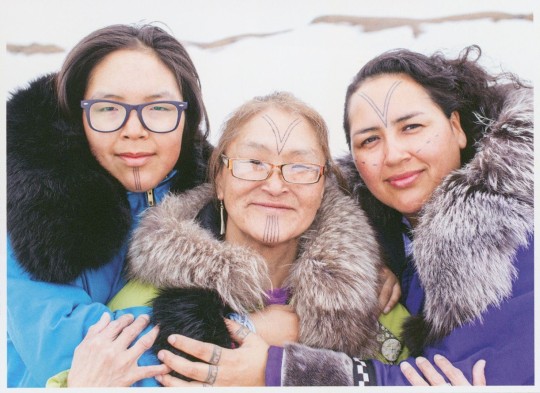
Angela Hovak Johnston (right) with her cousin Janelle Angulalik and her aunt Millie Navalik Angulalik.
View other posts from our Indigenous America Literature Collection.
#National Tattoo Day#tattoos#holidays#Inuit traditional tattoos#Inuit tattoos#Inuit#Inuk#Reawakening Our Ancestors' Lines#Angela Hovak Johnston#Cora DeVos#Cora Kavyaktok#Marjorie Tahbone#Inuit Tattoo Revitalization Project#Inhabit Media Inc.#photographs#Inuit women#Indigenous America Literature Collection#Native American Literature Collection
3K notes
·
View notes
Text
Another List of "Beautiful" Yupik & Iñupiat Words
for your next poem/story
Anetmun - toward the outside, downriver
Aŋmaaḳ - flint, firestone
Atsaruaq - chamomile
Ayagturainartuq - he is finally leaving after not being able to
Ciutnguaq - dried fruit, particularly dried apricot or apple
Ikpaksraaḳsugruk - many days ago
Ilutequq - he is emotionally pained, grieving
Im’utuunrituq - it is not as before
Ḳatraḳ - echo
Merr’aq - holy water
Mitḳuḳ - feather
Nangtequq - he is in pain, is ill
Nautchiaḳ - flower
Niġiŋa - rainbow
Pisuktuḳ - wants, desires
Qimugta - dog
Siḳiñiḳ - sun
Suŋauraaḳtaaḳ - blueness
Tangrruartuq - he is having a vision, hallucination; he is seeing something in his mind’s eye; he is watching a movie
Tuqutekluta - dying for us
Tuutaruaq - rose hip
Umyuaq - mind
Uvlaaḳ - morning
Uyumiḳsuḳ - misty, blurred
Yuurtuq (also yug’urtuq) - he became a person; was born
If any of these words make their way into your next poem/story, please tag me, or send me a link. I would love to read them!
Sources: 1 2 3 ⚜ More: Word Lists ⚜ Part 1
#requested#inuit#yupik#inupiat#language#langblr#word list#writeblr#writing inspiration#spilled ink#writing reference#dark academia#creative writing#light academia#literature#writers on tumblr#poets on tumblr#writing prompt#poetry#writing resources
69 notes
·
View notes
Text

#short story collection#short story collections#a kayak full of ghosts#lawrence millman#english language lit#indigenous lit#canadian indigenous literature#inuit lit#have you read this short fiction?#book polls#completed polls
7 notes
·
View notes
Text
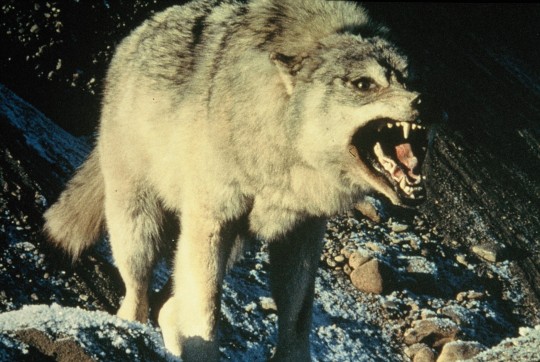
"Ich bin ein einsamer Wolf, doch manchmal jagt man im Rudel erfolgreicher!" (Zitat: Wolf-U. Cropp). Dazu der Bestseller "ALASKA-FIEBER"
#abenteuer#cropp#bücher#reisen#literatur#spannung#Wolf#Alaska#Fieber#WolfCropp#USA#Nordameriak#Eiswüste#Polarmeer#Inuit#Indianer#Eskimo
5 notes
·
View notes
Text
qimmik
roman von michel jean
erschienen 2024
im wieser verlag
isbn: 978-3-99029-652-3
(von tobias bruns)
qimmik erzählt parallel zwei geschichten aus nunavik, dem land der inuit - eine spielt sich in den sechziger jahren ab, die andere in der gegenwart. alle protagonisten des romans gehören dem volk der inuit an. in den sechziger jahren reist der jäger ulaajuk in ein kleines dorf im süden québecs, um felle zu verkaufen. er fällt mit seinem aussehen und seinem verhalten direkt der jungen saullu ins auge. sie verlieben sich und ziehen gemeinsam mit ihren hunden in den hohen norden, wo sie jahrelang trotz der widrigen klimaverhältnisse in der region sehr glücklich von der jagd und im einklang mit der natur leben. als saullu schwanger ist, will sie in ihr dorf zurückkehren, damit das kind im kreise der familie zur welt kommt - doch das dorf in das sie zurückkehrt, hat nichts mehr mit dem zu tun, was sie vor ein paar jahren verlassen hat: hässliche neue häuser, neue straßen und die abwesenheit von hunden prägen das bild. wie sie erfährt haben beamte der sécurité du québec alle für ihre kultur so wichtigen tiere erschossen. das drama nimmt mit der ankunft im dorf erst so richtig seinen lauf... die parallele geschichte handelt von der erfolgreichen jungen anwältin ève, die es schafft jedem den freispruch einzubringen sie ist eine inuk, die von weissen adoptiert wurde und nicht weiss, wer ihre wahren eltern sind. von ihrer kanzlei wird sie in den norden geschickt, um den vermeintlichen mörder mehrerer polizisten in ruhestand zu verteidigen. der mann möchte partout nicht reden und für die verhandlungen sieht es nicht gut aus. mit hilfe einer assistentin versucht sie selbst zu ermitteln und kommt den gründen des verbrechens langsam auf die spur - eine spur, die sie nicht erwartet hätte.
kurz gesagt: das buch ist genial! eine einzige lesefreude, wenn auch das ende ein wenig abrupt zu kommen scheint. die szenen in der rauen natur, der kalte im norden québecs, im leben des jungen pärchens dort, sind so lebendig beschrieben, dass man die kälte auf ihren jagden durch schnee und eis buchstäblich spüren kann (wunderbar erfrischend in diesen heissen sommertagen). das symbiotische leben, dass die inuit mit ihren tieren und der natur führen - oder geführt haben, ehe der kanadische staat so vieles zerstört hat - fasziniert und zeigt, wie weit sich der mensch im allgemeinen vom verständnis der natur abgewendet hat... michel jean verbindet in seinem roman mehrere katastrophen, die über die inuit im 20. jahrhundert hereingebrochen sind, wobei die zweite die für den roman namengebende ist - zum einen die massenweise staatliche entführung von inuit-kindern, die in heime kamen, um an weisse kanadier gegeben zu werden und zum anderen die vernichtung der für die inuit so wichtigen schlittenhunde, deren rasse dadurch sogar lange als ausgestorben galt - alles nur um eine funktionierende zivilisation zu zerstören, um ihr eine vermeintlich bessere zivilisation (die der "eroberer") ungefragt überzustülpen. wunderbar geschrieben verbindet michel jean historische ereignisse und tatsachen mit mitreißender fiktion und schafft es mit zwei strängen gestern und heute zu verbinden.
#qimmik#michel jean#wieser verlag#wieser#roman#philosophenstreik#rezension#tobias bruns#literatur#lesenmachtglücklich#kritik#literaturkritik#nunavik#québec#kanada#inuit#geschichte
0 notes
Text
A joyride to King William's Island
I started reading reading Heinrich Klutschak's "Als Eskimo unter den Eskimos. Eine Schilderung der Erlebnisse der Schwatka’schen Franklin-Aufsuchungs-Expedition in den Jahren 1878–1880" (As an eskimo among eskimo. An account on the experiences of Schwatka's Franklin search expedition in the years 1878-1880).
To my suprise, it's a rather light-hearted book up to now. The author shares a lot of anecdotes. For example there's the story about the adventurers trying to build their own igloo - resulting in them having to dress in frozen clothes in the morning while the walls are crumbling around them. From that point on they leave that task to the Inuit families they are traveling with.
Describing how the Inuit do things, how their clothes work, how igloos are build and how the dog sleds are maintained is Klutschak's main topic. You can really feel the fascination with this culture.
Well, I'll give a more detailed summary when I'm finished with it.
0 notes
Note
I've done my research and here are the historical inspirations for the main 18 Legions, for those who want it
1. Black Angels - Arthurian knights and Gregorian monks, High to Late Middle Ages England
2. ???
3. Emperor's children - Rome during the reign of Emperor Caligula, Phoenician society, Hundred Years Knights, Thirty Years' War soldiers, Ancien régime
4. Iron Warriors - Greek warring states, the Red army
5. White Scars - Mongol Empire, Turkish tribes, Toaist principles, China during the Yuan Dynasty
6. Space Wolves - Vikings, Anglo-Saxon tribes
7. Imperial Fists - Holy Roman Empire, Inuit culture, Teutonic Knights
8. Night Lords - Terror Troops, Wallachia under Vlad Țepeș, Congo under Belgian rule
9. Blood Angels - Italy during the Renaissance, Vampire literature
10. Iron Hands - Sparta in Antiquity, Highland Scots, the Gaels
11. ???
12. World Eaters - Gladiators, Beserkers, the Revolt of Spartacus, Attack-Dogs
13. Ultramarines - the Roman Republic, Athenian democracy
14. Death guard - the Battle of Osowiec Fortress, "Attack of the Dead Men", the victims of the Black Plague and the Spanish Flu, German ww1 stormtroopers
15. Thousand Sons - Egypt during the Old Kingdom
16. Sons of Horus - Germanic Tribes, Biblical Fallen Angels
17. Word Bearers - Bronze age civilizations, Georgia during it's Golden Age, The Crusades
18. Salamanders - North African cultures, Roman mythology
19. Raven Guard - Native American cultures, The Gurkhas
20. Alpha Legion - The Order of Assassins, the CIA, Celtic + Greek cultural elements
yes <3
75 notes
·
View notes
Text
some smaller bookstores, presses, and museum shops to browse and know about! Most support smaller presses, diverse authors and authors in translation, or fund museums and arts research)
(disclaimer: the only three I’ve personally used are the Yiddish book center, native books, and izzun books! Reccomend all three. Also roughly *U.S. centric & anglophone if people have others from around the world please feel free to add on
birchbark books - Louise Erdrich’s book shop, many indigenous and First Nations books of a wide variety of genres including children’s books, literature, nonfiction, sustainability and foodways, language revitalization, Great Lakes area focus (https://birchbarkbooks.com/)
American Swedish institute museum store - range of Scandinavian and Scandinavian-American/midwestern literature, including modern literature in translation, historical documents, knitters guides, cookbooks, children’s books https://shop.asimn.org/collections/books-1
Native books - Hawai’i based bookstore with a focus on native Hawaiian literature, scholarly works about Hawai’i, the pacific, and decolonial theory, ‘ōlelo Hawai’i, and children’s books Collections | Native Books (nativebookshawaii.org)
the Yiddish book center - sales arm of the national Yiddish book center, books on Yiddish learning, books translated from Yiddish, as well as broader selection of books on Jewish history, literature, culture, and coooking https://shop.yiddishbookcenter.org/
ayin press - independent press with a small but growing selection of modern judaica https://shop.ayinpress.org/collections/all?_gl=1kkj2oo_gaMTk4NDI3Mzc1Mi4xNzE1Mzk5ODk3_ga_VSERRBBT6X*MTcxNTM5OTg5Ny4xLjEuMTcxNTM5OTk0NC4wLjAuMA..
Izzun books - printers of modern progressive AND masorti/trad-egal leaning siddurim including a gorgeous egalitarian Sephardic siddur with full Hebrew, English translation, and transliteration
tenement center museum -https://shop.tenement.org/product-category/books/page/11/ range of books on a dizzying range of subjects mostly united by New York City, including the history literature cookbooks and cultures of Black, Jewish, Italian, Puerto Rican, First Nations, and Irish communities
restless books - nonprofit, independent small press focused on books on translation, inter and multicultural exchange, and books by immigrant writers from around the world. Particularly excellent range of translated Latin American literature https://restlessbooks.org/
olniansky press - modern Yiddish language press based in Sweden, translators and publishers esp of modern Yiddish children’s literature https://www.etsy.com/shop/OlnianskyBooks
https://yiddishchildrensbooks.com/ - kinder lokshen, Yiddish children’s books (not so many at the moment but a very cute one about a puffin from faroese!)
inhabit books - Inuit-owned publishing company in Nunavut with an “aim to preserve and promote the stories, knowledge, and talent of Inuit and Northern Canada.” Particularly gorgeous range of children’s books, many available in Inuktitut, English, French, or bilingual editions https://inhabitbooks.com/collections/inhabit-media-books-1
rust belt books - for your Midwest and rust belt bookish needs! Leaning towards academic and progressive political tomes but there are some cookbooks devoted to the art of the Midwest cookie table as well https://beltpublishing.com/
#Books#shopping reccomendations#Targeted/smaller and more specific presses can be jsut as dangerous even more so as you find so many things you didn’t know you needed!#(But you do! You so very much d)#Esp if you’re feeling like something beyond target book club picks lol
201 notes
·
View notes
Note
hello ro jeyneofpoole boatgirl. The fitzjames news has rocked my world and rotted my brain because I love a historical mystery solved. As a AMC terror and a real life terror fan, what texts would you recommend to someone who just watched amc terror and now wants to read the research on the real thing
i love love love when i get this question ok. if your first exposure to the franklin expedition was the terror i think your best jumping-off point is michael palin’s erebus: the story of a ship. yes he’s the guy from monty python, no he’s not a professional historian, but it’s entertaining and well-researched and a great way to familiarize yourself with the general concepts that other more elaborate texts will touch on. then you just GOTTA read dr. owen beattie’s frozen in time, it’s one of the most iconic pieces of franklin literature and the descriptions of the beechey exhumations are so near and dear to me. some of the lead stuff is on shaky legs now, but this book was revolutionary for the longest time. then there’s may we be spared to meet on earth edited by russell a. potter et. al., which is a collection of letters to and from members of the franklin expedition. after you’ve read the others listed here you’ll be crazy enough to cry over this one.
a more niche read that i just finished was david murphy’s arctic fox, which is a biography of leopold mcclintock and his arctic career. it’s super compelling and mcclintock lived a very interesting life and seemed like a pretty okay guy especially for the time; murphy does a really good job and i don’t see this one recommended at all but it’s actually good. there are some minor issues with some little details surrounding, like, the peglar papers, for example, but that’s what the other books are for. honorable mentions include (ie they’re on my shelf staring me down) ice ghosts by paul watson, unraveling the franklin mystery: inuit testimony by david c. woodman, the man who ate his boots by anthony brandt, james fitzjames: the mystery man of the franklin expedition by william battersby, and icebound in the arctic by michael smith. but do NOT and i mean do NOT under any circumstances read dan simmons’ absolute drivel that novel isn’t worth the paper it’s printed on. just watch the show and read these. ok love you byeeeee
#there are others of course but these i would consider to be the staples#thank you thank you thank youuuuuuu for asking#polar exploration#franklin expedition
56 notes
·
View notes
Text
"The best response to anyone who wants to take seriously Nietzsche's fantasies about savage hunters chopping pieces off each other's bodies for failure to remit are the words of an actual hunter-gatherer — an Inuit from Greenland made famous in the Danish writer Peter Freuchen's Book of the Eskimo. Freuchen tells how one day, after coming home hungry from an unsuccessful walrus-hunting expedition, he found one of the successful hunters dropping off several hundred pounds of meat. He thanked him profusely. The man objected indignantly:
'Up in our country we are human!' said the hunter. 'And since we are human we help each other. We don't like to hear anybody say thanks for that. What I get today you may get tomorrow. Up here we say that by gifts one makes slaves and by whips one makes dogs.'
The last line is something of an anthropological classic, and similar statements about the refusal to calculate credits and debits can be found through the anthropological literature on egalitarian hunting societies. Rather than seeing himself as human because he could make economic calculations, the hunter insisted that being truly human meant refusing to make such calculations, refusing to measure or remember who had given what to whom, for the precise reason that doing so would inevitably create a world where we began 'comparing power with power, measuring, calculating' and reducing each other to slaves or dogs through debt.
It's not that he, like untold millions of similar egalitarian spirits throughout history, was unaware that humans have a propensity to calculate. If he wasn't aware of it, he could not have said what he did. Of course we have a propensity to calculate. We have all sorts of propensities. In any real-life situation, we have propensities that drive us in several different contradictory directions simultaneously. No one is more real than any other. The real question is which we take as the foundation of our humanity, and therefore, make the basis of our civilization. If Nietzsche's analysis of debt is helpful to us, then, it is because it reveals that when we start from the assumption that human thought is essentially a matter of commercial calculation, that buying and selling are the basis of human society — then, yes, once we begin to think about our relationship with the cosmos, we will necessarily conceive of it in terms of debt."
- David Graeber, from Debt: The First 5,000 Years, 2011.
#david graeber#peter freuchen#quote#quotations#egalitarianism#inuit culture#worldview#mutual aid#anthropology#kindness#compassion#nietzche#neoliberalism#debt
103 notes
·
View notes
Text
I feel deficient in this class. My mother never speaks to me in Inuktitut anymore. Residential schools have beaten the Inuktitut out of this town in the name of progress, in the name of decency. Everyone wanted to move forward. Move forward with God, with money, with white skin and without the shaman's way. It made me wonder what I was not being taught. It made me wonder why the teachings I was receiving felt like sandpaper against my skin. It made me sad to have Inuktitut slip away. It lives under my subconscious just like the secrets of the teacher do.
Tanya Tagaq, Split Tooth
#Tanya Tagaq#Split Tooth#Inuktitut#residential schools#Truth and Reconciliation#National Day of Truth and Reconciliation#regret#loss#Indigenous literature#Inuit literature#quotes#quotes blog#literary quotes#literature quotes#literature#book quotes#Orange Shirt Day
122 notes
·
View notes
Text
Mitiarjuk Nappaaluk was 22 years old in 1953 when Catholic missionaries in Nunavik, the Inuit homeland in what is now northern Quebec, came to her asking for help in learning her native language. Nappaaluk started by writing down sentences in Inuktitut syllabics, using as many words as she could find. She eventually let her mind wander and started inventing characters, imagining the life of an independent young woman named Sanaaq. Nappaaluk ended up working on the story for more than 20 years, while also raising seven children, working as a teacher and spending summers in the family’s hunting camp. The writing was interrupted by two trips south to receive treatment for tuberculosis — the first a five-year stint, the second for six months — during the TB epidemic of the 1950s and ‘60s. When Nappaaluk returned to Nunavik, it was rapidly changing, as southern business interests, agents for the federal government and missionaries reshaped life in the North. She worked her impressions of these changes into the story. The result was Sanaaq, the first novel written in Inuktitut syllabics in Canada. It was published in Inuktitut in 1984 and has since been translated into both French and English. It is considered a classic of Inuit literature.
348 notes
·
View notes
Text
A List of "Beautiful" Yupik & Iñupiat Words
for your next poem/story
Alianaḳtuḳ - quiet, lonesome, sad
Anuḳsruruḳ - endures, suffers
Atsaq - berry
Elpengullruuq - it was you
Igaraa - he is writing to her
Igliḳtuḳ - travels, moves, traveller, stranger, visitor
Iktsuarpok - greatly anticipating the arrival of someone at your home that you keep going outside to see if they are there yet
Ilunŋutchaktuḳ - deeply angry, hurt, disturbed
Isuitchuḳ - eternal, endless
Ḳalukisaḳ - butterfly
Kaŋiḳsiruḳ - understands
Ḳivġuruḳ - when one leaves because they're angry
Ḳulvich - tears
Maancimatngurtua - I am here (though I had not planned to be here that long)
Mayitequq- he yearns for things he has been deprived of
Neviarciquq - he is desperately in love with a girl
Pagaatmun - across the sky
Piḳpaksriruḳ - loves, precious
Qiuryaq - aurora
Saiyutuġvik - tea pot
Siññaḳtuḳ - dream
Taluġnaitchuḳ - friendly, kind, communicative
Tuqucetaaq - poison
Uivaḳsaat - souls of the deceased going around and around
Yurainartuq - he is finally dancing
If any of these words make their way into your next poem/story, please tag me, or send me a link. I would love to read them!
Sources: 1 2 3 4 ⚜ More: Word Lists
#requested#inuit#yupik#inupiat#langblr#language#writing inspiration#writeblr#dark academia#writing reference#spilled ink#linguistics#light academia#creative writing#literature#writers on tumblr#poets on tumblr#writing prompt#poetry#writing resources
87 notes
·
View notes
Text
is my obsession w other people living on jarilo based in how much i wanna see an indigenous/inuit inspired civilization in hsr that perseveres and thrives despite everything? ya. but im right
also i am 100% convince theres more people on jarilo like i know lore says belobog is the last bastion of humanity on the planet and everything else is cold wastelands but no it is NOT there is definitely some people out there. like whether theyre more nomadic smaller groups who survive by following animal migration patterns or communities that repurposed structures or dug underground. theres other ppl out there. where are they
27 notes
·
View notes
Text

In Kürze erscheint die Fortsetzung meines Bestsellers "Alaska-Fieber".
#abenteuer#cropp#bücher#reisen#literatur#Alaska#Amerika#Eis#Schnee#Nordpol#Indianer#Eskimmo#Inuit#Iditarod#Hundeschlitten#Goldsuche
1 note
·
View note